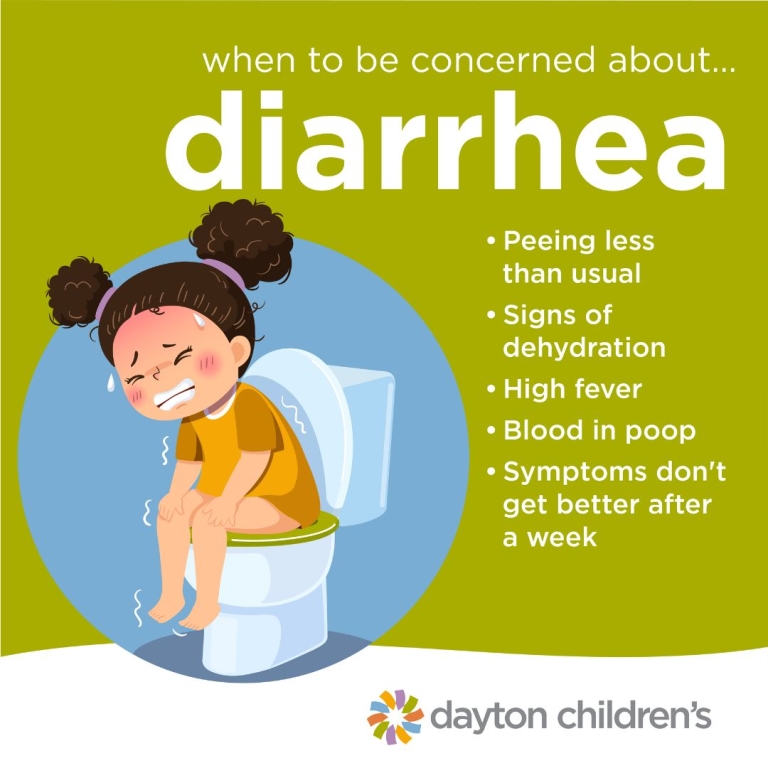12/11/23 blog post
when to be concerned about diarrhea

in this article:
- What causes diarrhea?
- How can I treat my child's diarrhea at home?
- When should I seek medical attention for my child?
Most children experience diarrhea at some point in their lives. While most cases of diarrhea are not serious and resolve on their own, chronic or severe diarrhea may require medical attention. We asked April Mathews, MD, pediatric gastroenterologist at Dayton Children's, to help us understand the causes and symptoms of diarrhea and when to seek medical attention.
what causes diarrhea?
Diarrhea is usually caused by an infection in the intestines known as gastroenteritis. Gastroenteritis happens when germs infect the stomach or intestines, causing inflammation. This inflammation can cause fever, abdominal pain, nausea, vomiting, decreased appetite and/or diarrhea. Everyone responds differently to these infections and may have varying degrees of symptoms. The following are the types of germs that cause diarrhea:
- Viruses: Viral gastroenteritis, also known as the stomach flu, is the most common cause of diarrhea in kids. The most common viruses are norovirus, rotavirus and adenovirus, and are easily spread. Some people may not have any symptoms but are still able to spread the virus to others. Symptoms last a few days and kids can get dehydrated if they don't drink enough liquids while they are sick, but generally don't require treatment.
- Bacteria: E.coli, Salmonella, Campylobacter and Shigella are bacteria that are often responsible for food poisoning. Diarrhea and vomiting usually happen within a few hours of eating contaminated food. Diarrhea can be severe and even contain blood. If you suspect a bacterial cause, it is best to contact your primary care provider as some children may require antibiotics.
- Parasites: The most common type of parasite infection in kids is known as Giardia, which can be found in water, food or other areas of poor sanitation (childcare centers, travel, camping, etc.). Contact your primary care provider if you suspect this type of infection as some children may require treatment.
While germs are the most common reason for diarrhea in kids, other factors can cause diarrhea:
- Drinking too much juice or sugar-sweetened beverages
- Food allergies
- Lactose intolerance
- Antibiotics
- Medical conditions such as celiac disease, thyroid disease, inflammatory bowel disease and irritable bowel syndrome
how can I treat my child's diarrhea at home?
Treating diarrhea at home can help reduce discomfort and prevent dehydration. However, if your child's diarrhea is severe, persistent or accompanied by other concerning symptoms, you should call your child's primary care provider to determine the best treatment plan.
For cases that are not severe, you can follow these tips to manage your child's diarrhea at home:
- Encourage your child to drink plenty of fluids such as clear broths, diluted fruit juices, and oral rehydration solutions such as Pedialyte and water.
- Avoid sugary drinks, soda and caffeinated beverages. They can worsen diarrhea and therefore dehydration.
- Try the BRAT diet (bananas, rice, applesauce and toast) to help firm up stools.
- Avoid foods that are fatty, spicy, greasy or contain dairy, which can be more difficult to digest during times of illness.
- Probiotics may reduce the duration and severity of diarrhea in some cases. Ask your child's primary care provider before giving your child a probiotic supplement.
- Ensure proper handwashing to prevent the spread of infection.
- Encourage your child to rest and stay comfortable.
Symptoms may take time to fully resolve. Post-viral syndromes following an infection can include abdominal pain, nausea, reflux, bloating, decreased appetite and even lingering diarrhea. Stay in touch with your pediatrician to know if or when you should be concerned and any further steps that may be necessary.
when should I seek medical attention for my child?
In rare cases, diarrhea can be caused by a larger physical problem. If your child is experiencing any of the following symptoms, call your primary care provider or consider an evaluation at urgent care or the emergency department if your primary care provider is not available:
- Peeing less than usual
- Signs of dehydration - crying with fewer tears, dry mouth or cracked lips, dizzy or lightheaded, very sleepy or less alert
- High fever
- Blood in poop
- Symptoms that don't get better after a week
- Other severe or concerning symptoms such as severe abdominal pain, inability to keep fluids down or symptoms waking your child up from sleep, blood in urine, bruising or easy bleeding, joint swelling/redness
Your child's primary care provider will guide you on the next steps. If it is recommended that your child be seen by a specialist in gastroenterology, you can schedule an appointment online.





